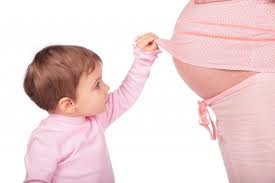Chemicals in Products Affect Unborn Kids
A new study ties fragrance and plastic-softening chemicals to behavioral problems and lower test scores in children exposed to the chemicals before birth.
Think twice about wearing foundation and other cosmetics while pregnant, and evict phthalate-containing scented candles, laundry products, air fresheners, and personal-care products from your house.
Release: RODALE NEWS
Pregnant mothers with high exposure levels to makeup and plastic-softening chemicals called phthalates are more likely to report disruptive and problem behaviors in their children four to nine years after the child's birth, according to a first-of-its kind study published Thursday in the journal Environmental Health Perspectives. As with a recent study linking the chemical bisphenol-A to aggression in children, this study raises concerns about the effects of exposure to common chemicals during pregnancy. "It's important to remember that childhood exposure begins before the child is born, so it's the mother's contact with consumer products that matters during pregnancy," explains study author Stephanie Engel, MPH, PhD, associate professor of preventive medicine at Mount Sinai School of Medicine in New York City.
THE DETAILS: To figure out phthalate exposure, Mount Sinai researchers tested the urine of 188 expectant mothers during their third trimester of pregnancy for the presence of 10 specific phthalate metabolites. Then, mothers were interviewed one to three times while their children were 4 to 9 years old, answering standard questionnaires to assess their children's behavior and cognitive functioning. The researchers found that prenatal exposure to a group of phthalates commonly found in personal-care products like makeup, hairspray, perfume, body sprays, scented shampoos, soaps, and lotions was significantly associated with poorer scores for problems with aggression, conduct, and emotional control. Associations did not appear to differ between boys and girls overall, and the associations were stronger as with higher levels of exposure.
WHAT IT MEANS: This study is the first to compare the behavior of children in this age group based on their phthalate exposure before birth. "Pregnancy is a uniquely vulnerable stage in development. Even in the absence of consensus, there is sufficient evidence today to support the plausibility of harm from phthalate exposure, particularly in the context of fetal development," says Engel. "The prudent course is to avoid exposure as much as possible, and to press for regulatory action requiring consumer product labeling." Previous research has also tied phthalates in hairspray to hypospadias, a genital birth defect that involves the urethra opening on the underside of the penis. Last year, a study published in the International Journal of Andrology found boys exposed to higher levels prenatally were not as interested in masculine behaviors and male toys when compared with boys whose mothers had fewer phthalates in their bodies. Even if you're not pregnant, it's important to avoid these chemicals. Phthalates have been linked to hormone disruption because they act like artificial estrogen in the body, and also are associated with an increased risk of allergies and asthma.
You likely won't find phthalates listed on product labels, but the truth is, they hide inside the majority of personal-care products, and in many other items found around the house, including air fresheners, scented candles, laundry products, vinyl flooring, vinyl shower curtains, and many soft plastic toys. Some pharmaceutical drugs and supplements also contain phthalates.
Going completely phthalate-free may be an impossible goal, but you can reduce your exposure by following these tactics.
Choose safer flooring options. Vinyl flooring emits phthalates and other potentially harmful chemicals. Since carpets can also contain a toxic mix of carcinogens like formaldehyde and respiratory irritants (and they trap dust that even the best vacuum can't remove), choose hardwood or cork for your baby's room floor, and use accent rugs made of natural fibers, such as untreated cotton, jute, or seagrass.
• Choose unscented anything. For personal-care items, you can look for terms like "fragrance," "parfum," "d-limonene," and "linalool" on the label as a way to cut phthalate exposure. Synthetic fragrances equal phthalates, though product labels don't tell you that. "In practice, avoiding phthalates is complicated by the lack of mandatory product labeling. In personal-care products they may be listed only as 'fragrance,'" says Engel. Manufacturers of many other types of household products, however, don't have to disclose their ingredients, so choose unscented laundry detergents, natural beeswax candles, and other fragrance-free items to minimize the amount of phthalates in your home environment. "One way to have higher confidence that a product is phthalate free is to look for brands that advertise that, or to look for fragrance-free or unscented products," explains Engel.
• Lay off the makeup. Previous research has found our bodies absorb about five pounds of cosmetics chemical a year. That's not good news, considering most of these chemicals have never been adequately tested for safety. Manufacturers pump cosmetics full of phthalates to either carry fragrance chemicals, or to make the product stick to you better. So with cosmetics, less is more, especially if you're pregnant. To assess the safety of the cosmetics, shampoos, lotions, and other personal-care products you use, visit Environmental Working Group's Cosmetic Safety Database. The public-health-watchdog group rates personal-care products from 0 (the safest) to 10 (the most dangerous) based on studies performed on the ingredients. Keep in mind that powdered foundations may be ranked lower (safer), but they pose an inhalation risk that can lead to lung damage. If you do use powder, apply it with a sponge instead of a brush to lower the amount of chemicals you inhale, and stay away from products that use micronized ingredients.
• Take a safer shower. Vinyl shower curtains gas volatile organic compounds for at least a month after you put them up, and they also contain phthalates. Look for phthalate-free plastic shower curtains—IKEA is one retailer that sells them—or choose curtains made from hemp fiber, which is naturally mold-resistant and will last a long time if cared for properly.
HOLISTIC APPROACH TO HEALTH AND BEAUTY Kasia Organic Salon is a leading pioneer in healthy beauty to fit your lifestyle. Follow us to ammonia-free /MEA/PPD Color, organic facials, and natural and organic products that support your life. Learn how diet, products and environmental factors can rob us of our radiance and how to easily incorporate an "Informed Beauty" lifestyle to restore our outward beauty from within.
